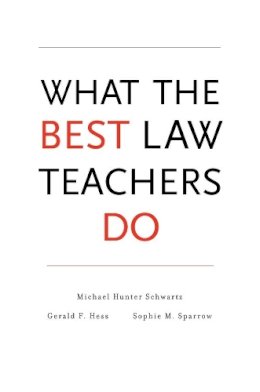
What the Best Law Teachers Do
Michael Hunter Schwartz
What makes a great law professor? The first study of its kind, What the Best Law Teachers Do identifies the methods, strategies, and personal traits of professors whose students achieve exceptional learning. This pioneering book will be of interest to any instructor seeking concrete, proven techniques for helping students succeed.
What the Best Law Teachers Do introduces readers to twenty-six professors from law schools across the United States. These instructors are renowned for their exacting standards: they set expectations high, while also making course requirements--and their belief that their students can meet them--clear from the outset. They demonstrate professional behavior and tell students to approach class as they would their future professional life: by being as prepared, polished, and gracious as possible. And they prepare themselves for class in depth, even when they have taught the course for years.
The best law professors understand that the little things matter. They start class on time and stay afterward to answer questions. They learn their students' names and respond promptly to emails. These instructors are all tough--but they are also committed, creative, and compassionate mentors. With its close-to-the-ground accounts of exceptional educators in action, What the Best Law Teachers Do offers insights into effective pedagogy that transcend the boundaries of legal education.
Product Details
About Michael Hunter Schwartz
Reviews for What the Best Law Teachers Do
Alison Grey Anderson, University of California, Los Angeles This book fills an enormous vacuum in law teaching literature. Based on painstaking, methodical, individual attention to 26 carefully-selected law professors from around the country, it presents cogent, inspiring, and concrete approaches to teaching and student-teacher relationships in the voices of the teachers and their students themselves.
Jean Koh Peters, Yale University The authors present several interesting ideas relevant to teaching and learning law, ideas that should flourish at a time when law schools are seeking ways to reinvent themselves. The intended reach of this book, primarily teachers of law, is narrow, but teachers of all subjects stand to benefit.
Publishers Weekly
